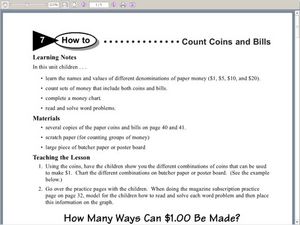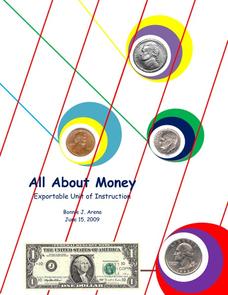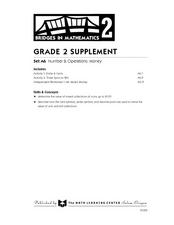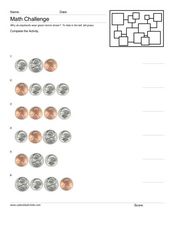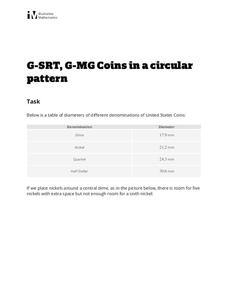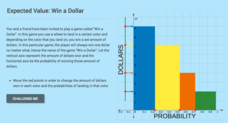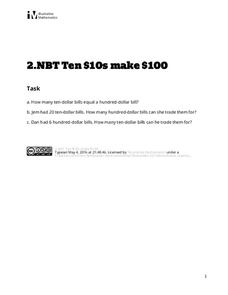Curated OER
Count Coins and Bills
Lower graders recognize coins and paper money and understand its value. They participate in a variety of money problems to appreciate the value of money. Students add, subtract, chart and solve money problems.
Curated OER
All About Money
Few topics engage young mathematicians as much as learning about money. Through a series of shared readings and hands-on activities, children explore the US currency system, learning how to count money and calculate change as they create...
Curated OER
The Value of Coins
How much is a penny, nickel, dime, and quarter worth? Learners count and make various coin variations that equal a given denomination. Each slide contains images and explanations on how one should count coins to add them up.
Carstens Studios
Math Doodles
Discover the joy and excitement of improving your math fluency through four different puzzles. Combine those with 25 different ways to represent numbers and you have hours of enjoyment that can be fun outside of the classroom as well.
Math Learning Center
Grade 2 Supplement Set A6 – Number and Operations: Money
Young scholars get familiar with money during this series of engaging math activities. A game has class teams accumulating money and using symbol and number cards to display their total amount correctly on a pocket chart. All the symbol...
Curated OER
Math Challenge: Count Coins
In this counting change worksheet, students count the values of pennies, nickels, and dimes to determine the total amount of each group of coins. Students solve 6 problems.
Curated OER
Value Of Money
Students read the book "Alexander, Who Used To Be Rich Last Sunday," along with their teacher and take away coins as they follow along with the story. In this money and counting lesson, students get meaningful practice in the art of...
Curated OER
Money
Converting money is both practical and an excellent gateway into future math concepts, and scholars get plenty of practice here! There are four sections, each with 12 values for them to convert. First, they change cent values into...
CK-12 Foundation
Expected Value: Game of Chance
Determine whether the payoff is worth it. Pupils calculate the expected value of a game with three different payoff levels. Each level has a different probability of winning money. The scholars find the expected payoffs for each...
Curated OER
Identifying Coins and Their Value
Use the special Tennessee State Quarter as a learning tool. During this instructional activity, discuss why the Tennessee Quarter has musical instruments on it. You can also utilize a worksheet embedded in the plan to help your class...
Curated OER
Counting Money
Money is always a source of interest for young mathematicians, so utilize their engagement by adding up coin values. For each set of coins (quarter, dime, nickel, and penny) scholars count up and write the total. The example has them...
US Mint
Coin Connections
Help young mathematicians make cents out of the US currency system with this two-part math lesson. Children first learn the names and values for each type of coin, before learning to count and compare the values of coins using the...
Elementary AMC
Earth Day Math
Take some time this Earth Day to nourish the growth of your young mathematicians with this series of task cards. Whether it's the four basic operations, place value, money, or elapsed time, these conservation-themed problems...
Curated OER
Math Mammoth End of the Year Test - Grade 3
In this comprehensive diagnostic test worksheet, learners examine, study, calculate and solve 38 math problems. They work with a variety of basic math concepts and word problems.
Illustrative Mathematics
Money in the Piggy Bank
It's time to crack open that piggy bank and see what's inside. First, count up the pennies, nickels, dimes, and quarters, identifying what fraction of them are dimes. Then calculate the total value of the coins, writing another fraction...
Curriculum Corner
Fifth Grade Summer Math Booklet
A 33-page packet focuses on fifth-grade math concepts. Learners practice rounding numbers to the hundred thousands, thousands, hundreds, tens, ones, hundredths, thousandths, and hundred thousandths. They also compare whole...
Illustrative Mathematics
Coins in a Circular Pattern
What starts as a basic question of division and remainders quickly turns abstract in this question of related ratios and radii. The class works to surround a central coin with coins of the same and different values, then develops a...
CK-12 Foundation
Expected Value: Win a Dollar
Spin a wheel, land on a color ... and win. Learners create a graph to display the probabilities of the amount of money they can win by spinning a colored wheel. The pupils use the dollar amounts and their probabilities to calculate the...
CK-12 Foundation
Expected Value: Playing Darts
The expected payoff is right on target. An interactive resource provides a dart game scenario with amounts of cash prizes and probabilities of winning. Learners calculate the expected value and expected payoff for the game. To...
Curated OER
Recognizing Coins
Help your class identify the different pence and pounds used in Great Britain. Each slide contains an image, the name, and value of British coinage. Great if you're teaching in Britain, if you want to extend your American class's...
Illustrative Mathematics
Ten $10s Make $100
If ten $10s make $100, then how much money do twenty $10s make? Young bankers find the number of bills required to make base ten amounts in three different word problems.
Eduplace
Challenge: Find the Value
This assignment makes a lot of cents! Learners write the multiplication equation to figure out what the amount of nickels are worth and then find the value. They complete three problems and one short-answer problem. An answer key follows...
Curated OER
Money Problems: Pounds and Pence
Teaching youngsters how to handle money is a great way to bring math to life. This series of problems encourage learners to use problem solving strategies such as, underlining, and circling information to solve. Note: This resource was...
EngageNY
End-of-Module Assessment Task: Grade 6 Math Module 3
The last installment of a 21-part module is an end-of-module assessment. Individuals show their understanding of positive and negative numbers on the number line, absolute value, and the coordinate plane in a variety of contexts.
